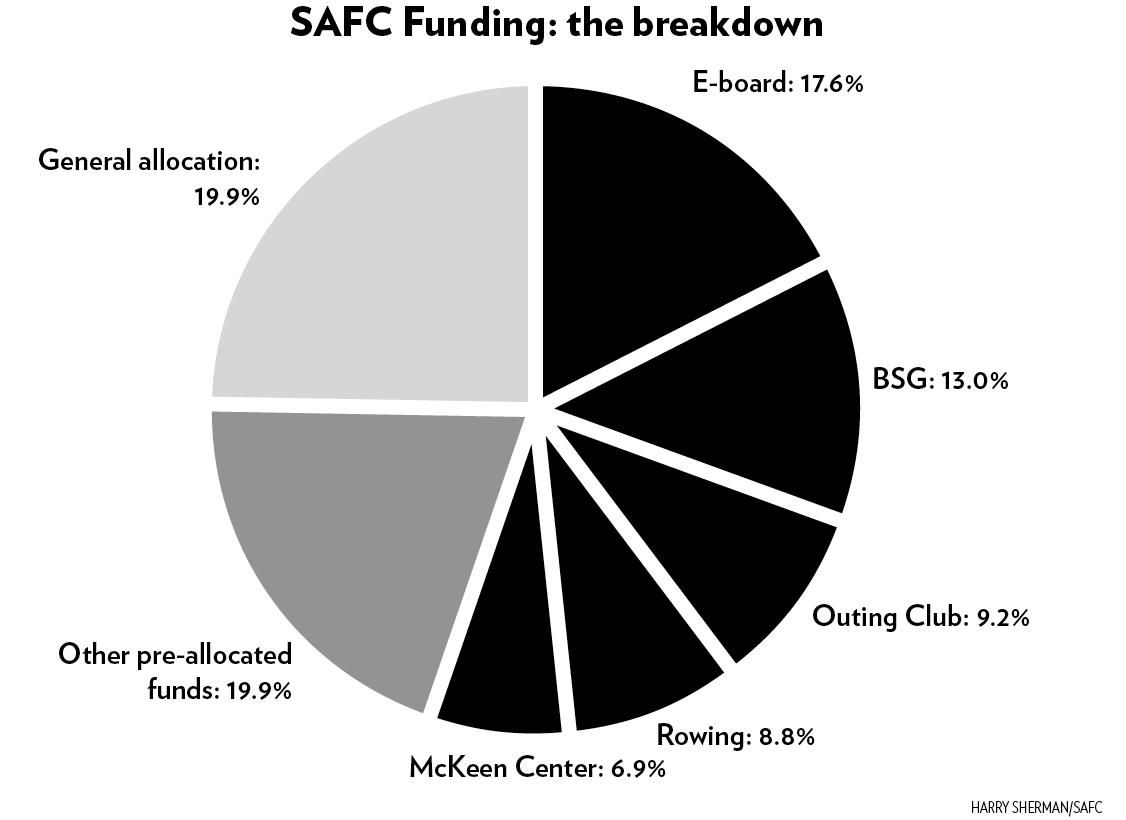SAFC funding: breaking down the biggest users
October 26, 2018
Five groups use more than half of all Student Activities funding, That’s one of the takeaways from the Student Activities Funding Committee (SAFC) digest, a monthly releaase outlining the committee’s allocation of funds to student groups. The goal of the digest was to make the SAFC’s budget more transparent.
“Every student is contributing to the overall budget,” said Bowdoin Student Government (BSG)Treasurer Harry Sherman ’21. “I thought it was important that students get some sort of insight into how that money is being spent around campus.”
The SAFC’s budget is primarily sourced from students’ activities fee, which is built into Bowdoin’s tuition and fees. Each student contributes $500 per academic year, although this fee is covered for some students who receive financial aid. The budget is supplemented by the Office of Student Activities, but students’ tuition makes up the majority of its funding.
The student-run SAFC is comprised of the Chair of the Treasury, four class treasurers, the Chair of the Student Organizations Oversight Committee, two At-Large representatives that are appointed by the treasurer and a faculty advisor. All members participate in voting, with the exception of the BSG treasurer and the faculty advisor.
“I was a little surprised at how much autonomy the student run committee has over this money,” said Sherman. “It really is all up to us. There’s guidelines, but it definitely is shocking.”
However, Sherman emphasized that transparency is a priority of the committee, and that the new digest is a manifestation of that prioritization.
“It’s a document that’s a little more user friendly,” said Sherman. “I thought people might like to get a better idea of our decisions as a whole. I wanted to take a different approach and get the campus a little bit more involved.”

The first digest in late September revealed that the SAFC has already allocated $523,974, or 74.85 percent, of its total budget for the year. The five most funded groups—the Entertainment Board, Bowdoin Student Government, the Bowdoin Outing Club, Rowing and the McKeen Center for the Common Good—received 55.5 percent of the funding.
These clubs are all allocated operating budgets, which are determined before the start of the academic year. The majority of club funds operate based on need as it rises, which involves submitting request forms to the SAFC.
“We try to get the most bang for our buck, in the sense that every dollar we spend, every student, in some way, benefits,” said Sherman. “There are some clubs that have definitely earned those funds. Definitely the impact the club has on the community will affect how much money they get.”
The Entertainment Board has historically received the highest amount of funding of any one organization from the SAFC—this year, it was allocated approximately $123,00, or 17.6 percent of the total budget. However, this marks a $6,000 decrease from last year.
“We decided that $6,000 wouldn’t manifest in massive difference in quality of the entire weekend.” said Sherman. “We have a lot of clubs that we want to help out and fund, and that $6,000 will go a very long way in making other stuff happen on campus.”
According to Entertainment Board co-chair Jono Harrison ’19, the budget cut will affect the spring Ivies concerts, but not significantly.
“It wasn’t ideal to be cut, but I think that the way that we function, we have more than enough confidence to put on great concerts for the student body regardless of the budget cuts,” said Harrison.
The second-most funded club is BSG, which has thus far received 13 percent of the total SAFC budget. In the past, this budget has gone towards expenses such as the picnic tables outside Moulton and the newly-added charging stations in Thorne. BSG has several committees with different areas of jurisdiction.
“People are elected to be on BSG. If they’re going to be in power to make a difference on campus, then we should equip them to have the resources to do that,” said BSG President Mohamed Nur ’19.
This year, the BSG created its budget to reflect the new Committee of Diversity and Inclusion, chaired by Mamadou Diaw ’20. The committee is increasing funds to programming for events such as No Hate November.
The McKeen Center also received an increase in funding to support Bowdoin Votes.
“Historically, the College has actually just left it to students to do all their own ‘get out the vote’ work,” said Andrew Lardie, associate director of the McKeen Center. “The outcomes from that approach have not been very robust in terms of participation, so we’re doing a lot of that work. We see it as being suitable for SAFC funding.”
While the rowing team does not affect as many members of the student body, it receives 8.8 percent of the total SAFC budget, or roughly $62,000. According to Head Coach Doug Welling, the majority of these funds go towards race entries, student travel and lodging.
“They’ve been incredibly generous in listening to our needs and trying to understand a sport that’s pretty hard to understand,” said Welling. “I’d say it’s been pretty tremendous and as the program has either grown or race entries have increased, we’re listening to that piece of it.”
Welling emphasized the importance of student autonomy in allocating funds. “[The SAFC] does put a lot of responsibility back in the students’ hands,” he said. “It gives them that chance to really have a significant role in the accounting and the budgeting of the program. It’s pretty cool that there’s so much student involvement in it.”

Comments
Before submitting a comment, please review our comment policy. Some key points from the policy: